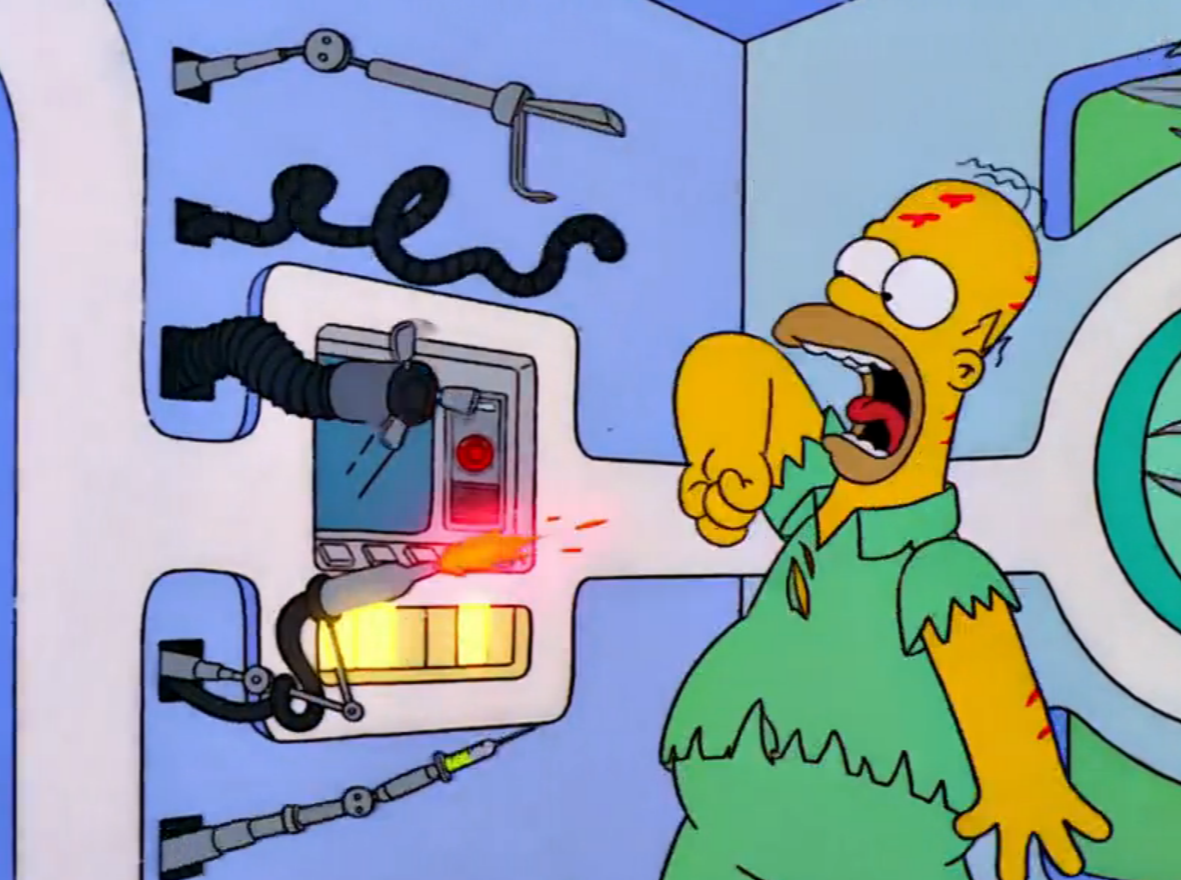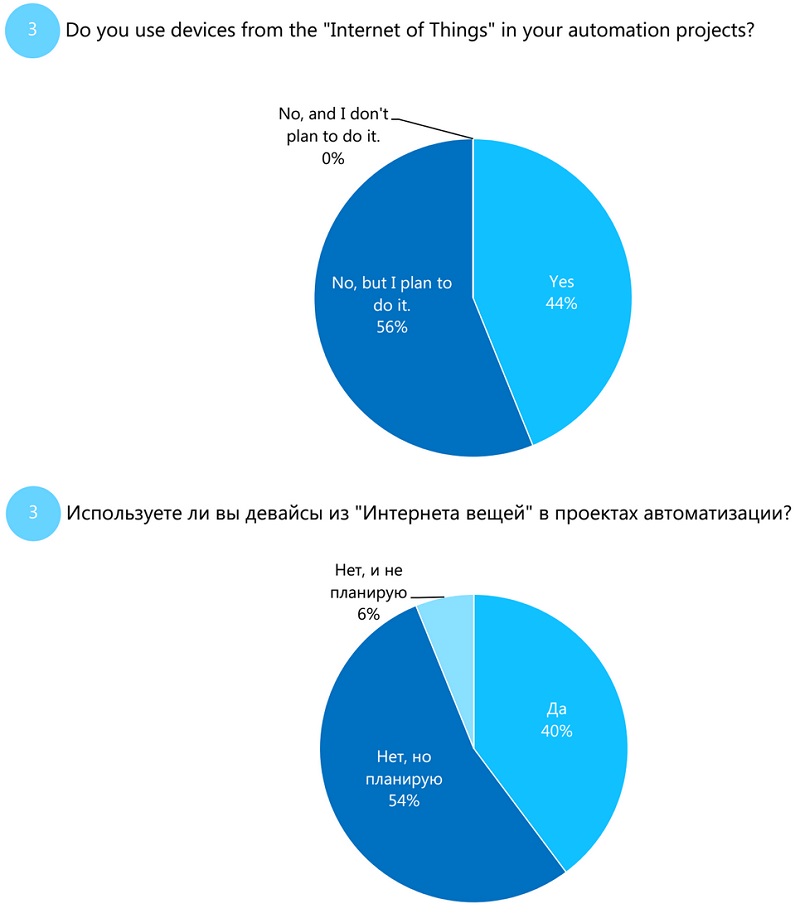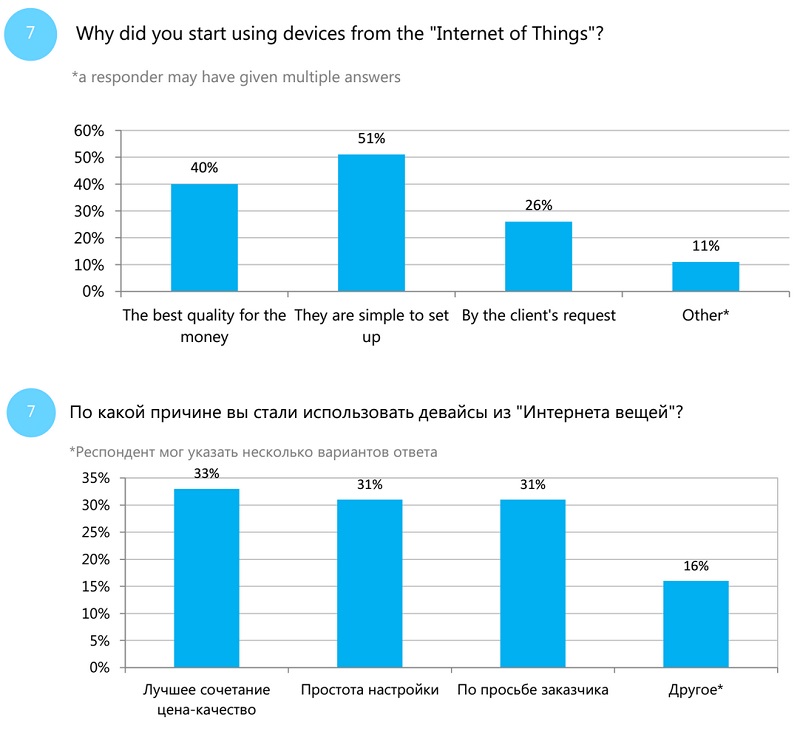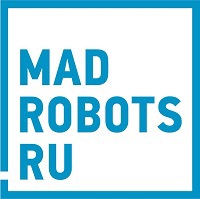The Internet of things in Russia and the world: what integrators think and what awaits the market
Madrobots online store , together with the developer of iRidium mobile smart home software, shares views on the current situation and the immediate prospects of the Internet of Things (Internet of Things - IoT) in Russia.

IRidium conducted a survey, interviewing more than two hundred respondents from Russian and foreign installation companies about their relationship to IoT, the use of the Internet of things in their automation projects and views on the future of this segment, and presented the result in two reports: on the Russian segment Russian ) and the study of the foreign segment ( in English ).
Since the questions asked in both language versions of the study are identical, it is curious to answer not only talk about the future of the Internet of Things, but also compare civilizational differences in the approach to it in Russia and the rest of the world. From this point of view, the answer to the question of using IoT devices in automation projects is particularly interesting: the answers to “Yes” and “No, but I plan” for English-speaking respondents were added 6% categorical “No, and I do not plan” with us.
')

According to the commercial director of iRidium mobile Anton Kamaev, the profiles that answered “No and do not plan” are companies with work experience of 10 years or more. The reasons for such luddism may be revealed by the comment of one of the respondents:
In addition, the IoT market has specific problems. Both our and foreign integrators complain about the unavailability of documentation and the closeness of some decisions:
The Internet of Things has growth problems, Kamaev explains: “According to the forecast, there will be 6.6 smart devices per person by 2020. In this case, there is still no standard for the interaction of smart devices with each other. Many work on this problem, they unite in groups to solve this problem. I believe that such major players as Google, Apple, Microsoft and Samsung will want to set this standard.
However, the confidence of 94% of respondents in the inevitability of the Internet of things means that the remaining 6% will most likely have to revise the principles - or leave the market. The confidence of integrators is easy to understand by analyzing the reasons for choosing IoT devices in their projects:

Foreign integrators again look more rational than ours in this matter, but this can be explained by a more developed market - for Russia, smart homes are still an expensive toy, and it is not surprising that many customers want to play in everything new and fashionable. But still the choice in favor of IoT-devices by objective criteria (price-quality and ease of installation) is expressed quite clearly.
According to Kamaev, “it is already clear that IoT is getting more and more connected with automation, especially in the home segment. It is also erroneous to assume that IoT will not penetrate the commercial segment - the same iBeacon sensors will perfectly help to save on energy consumption, given the location of employees. ”
Integrators choose the Internet of things because IoT offers truly competitive solutions today - i.e. Demand for the Internet of Things is shaped by supply. This makes the coming offensive of IoT devices truly unavoidable. But how ready is the market now?
The point of view of Madrobots is presented by Nikolay ni404 Belousov, CEO :
“The situation with domestic IoT in Russia is deplorable - it simply does not exist. In Russia, the concept of "smart home" was fixed to complex systems in installation, developed on the basis of KNX or Crestron systems. Such solutions cost customers hundreds of thousands of rubles and provide five functions of a smart home:
Over the past couple of years, thanks to the Kickstarter and Indiegogo platforms in the west, several dozens of technological startups have appeared about energy efficiency, monitoring systems, heating and ventilation systems. There are a number of companies in Russia - for example, evika.ru - which are developing solutions for energy metering (everyone remembers the need to send data from electricity meters to receipts each month), or the same cloud video service Ivideon.ru for remote monitoring, which launched in the fall 2014 own camera on the American market under the brand Oco. There are no system solutions that combine the capabilities of temperature, smoke, motion, and home access systems or remote monitoring.
Russian users are waiting for the following features:
And during 2015 we will see similar box solutions costing around 10,000–30,000 rubles from domestic manufacturers. ”
IRidium opens the curtain on its plans: “we are working on our own IoT solution, which will allow us to standardize, set up visualization rules for working with smart gadgets, when managing all things from one application for iPhone, Android, Google Glass, smart watches and anything with minimal custom settings. "
But iRidium doesn't believe that 2015 will be a breakthrough year for IoT in Russia, Kamaev says:
“He would not be a breakthrough for Russia without a crisis, and even more so with a crisis. Even if an interesting box solution appears, which Nikolai Belousov is talking about, it may have a wow effect, but it will take a couple of years to get to sales and volumes. ”
Day is nearing
when your washing machine
will like your selfie







Internet of things from the point of view of professionals
IRidium conducted a survey, interviewing more than two hundred respondents from Russian and foreign installation companies about their relationship to IoT, the use of the Internet of things in their automation projects and views on the future of this segment, and presented the result in two reports: on the Russian segment Russian ) and the study of the foreign segment ( in English ).
Since the questions asked in both language versions of the study are identical, it is curious to answer not only talk about the future of the Internet of Things, but also compare civilizational differences in the approach to it in Russia and the rest of the world. From this point of view, the answer to the question of using IoT devices in automation projects is particularly interesting: the answers to “Yes” and “No, but I plan” for English-speaking respondents were added 6% categorical “No, and I do not plan” with us.
')

According to the commercial director of iRidium mobile Anton Kamaev, the profiles that answered “No and do not plan” are companies with work experience of 10 years or more. The reasons for such luddism may be revealed by the comment of one of the respondents:
Not encountered, but interested. The main problem for the “love of such products” is the low price of the installation and the simplicity of commissioning in such devices. The installer is cheap and easy commissioning is not interesting. Accordingly, in theory, the “Internet of things” should be an area where qualification is required for commissioning. By the way, iridium is quite laborious in this regard, a product and interesting for the installer.
2. Surely there are - from the obvious - everything related to the defense industry (defense, army, etc.), ending with personal considerations of clients in the same commercial segment. I looked at the profiles of these 6% of those who answered “No and do not plan” - these are companies with work experience of 10 years or more - maybe they will adapt for a changing market longer ... not sure.
In addition, the IoT market has specific problems. Both our and foreign integrators complain about the unavailability of documentation and the closeness of some decisions:
Lack of a good technical description. Not all manufacturers share this information. In case of difficulties, in Russia there is no specialist from the manufacturer of equipment for the provision of advice. We have to go to the English-speaking forums and look there. There are undocumented features, there are, on the contrary, unrealized commands (left for the future). We have to order equipment in advance and adjust it by “experiments”.
The Internet of Things has growth problems, Kamaev explains: “According to the forecast, there will be 6.6 smart devices per person by 2020. In this case, there is still no standard for the interaction of smart devices with each other. Many work on this problem, they unite in groups to solve this problem. I believe that such major players as Google, Apple, Microsoft and Samsung will want to set this standard.
However, the confidence of 94% of respondents in the inevitability of the Internet of things means that the remaining 6% will most likely have to revise the principles - or leave the market. The confidence of integrators is easy to understand by analyzing the reasons for choosing IoT devices in their projects:

Foreign integrators again look more rational than ours in this matter, but this can be explained by a more developed market - for Russia, smart homes are still an expensive toy, and it is not surprising that many customers want to play in everything new and fashionable. But still the choice in favor of IoT-devices by objective criteria (price-quality and ease of installation) is expressed quite clearly.
According to Kamaev, “it is already clear that IoT is getting more and more connected with automation, especially in the home segment. It is also erroneous to assume that IoT will not penetrate the commercial segment - the same iBeacon sensors will perfectly help to save on energy consumption, given the location of employees. ”
Integrators choose the Internet of things because IoT offers truly competitive solutions today - i.e. Demand for the Internet of Things is shaped by supply. This makes the coming offensive of IoT devices truly unavoidable. But how ready is the market now?
Internet of things in everyday life
We must follow the market.
- survey participant.
The point of view of Madrobots is presented by Nikolay ni404 Belousov, CEO :
“The situation with domestic IoT in Russia is deplorable - it simply does not exist. In Russia, the concept of "smart home" was fixed to complex systems in installation, developed on the basis of KNX or Crestron systems. Such solutions cost customers hundreds of thousands of rubles and provide five functions of a smart home:
- control and communication systems
- heating, ventilation and air conditioning system
- lighting system
- building power supply system
- security and monitoring system
Over the past couple of years, thanks to the Kickstarter and Indiegogo platforms in the west, several dozens of technological startups have appeared about energy efficiency, monitoring systems, heating and ventilation systems. There are a number of companies in Russia - for example, evika.ru - which are developing solutions for energy metering (everyone remembers the need to send data from electricity meters to receipts each month), or the same cloud video service Ivideon.ru for remote monitoring, which launched in the fall 2014 own camera on the American market under the brand Oco. There are no system solutions that combine the capabilities of temperature, smoke, motion, and home access systems or remote monitoring.
Russian users are waiting for the following features:
- remote video monitoring and sensors of unauthorized access to the room
- Intelligent light control and energy tracking (motion sensors, people sensors, energy sensors, changing lighting levels depending on time of day and weather)
- smart locks and intercoms (access to a room without keys, the ability to collect information about visitors)
And during 2015 we will see similar box solutions costing around 10,000–30,000 rubles from domestic manufacturers. ”
IRidium opens the curtain on its plans: “we are working on our own IoT solution, which will allow us to standardize, set up visualization rules for working with smart gadgets, when managing all things from one application for iPhone, Android, Google Glass, smart watches and anything with minimal custom settings. "
But iRidium doesn't believe that 2015 will be a breakthrough year for IoT in Russia, Kamaev says:
“He would not be a breakthrough for Russia without a crisis, and even more so with a crisis. Even if an interesting box solution appears, which Nikolai Belousov is talking about, it may have a wow effect, but it will take a couple of years to get to sales and volumes. ”
Day is nearing
when your washing machine
will like your selfie






Source: https://habr.com/ru/post/238023/
All Articles